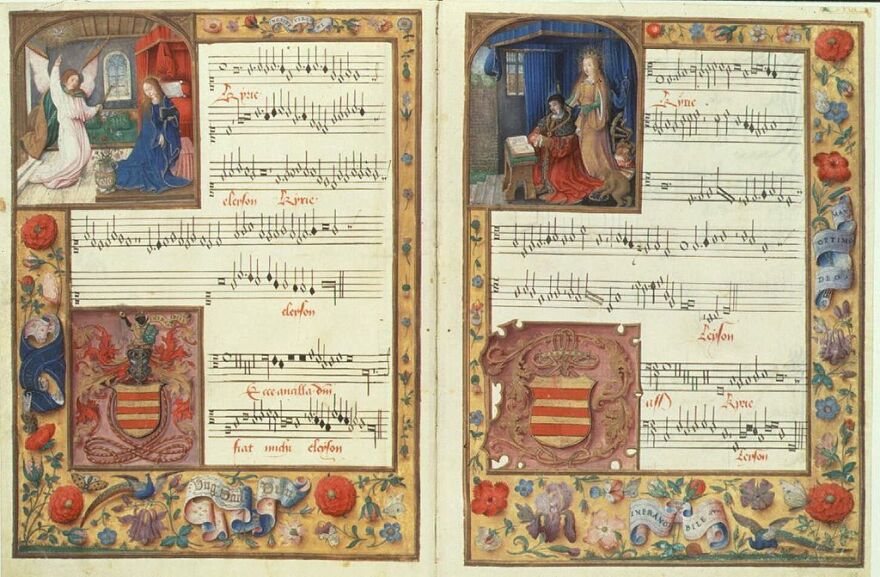Whether it's music by the Sufjan Stevensor 12th-Century composers from Paris, the music of Christmas has always brought joy, awe, and festivity. Likewise, it is in celebrating the rich history of the music of Christmas that we can appreciate how traditions have changed but the meaning of the holiday has remained. Here is a short history of Christmas music from the Middle Ages and Renaissance.
Pre-Carolinginan Christmas Carols (aka, Music before Charlemagne)
The earliest Christmas music was likely written in the 4th Century by St. Ambrose of Milan, and it was actually a religious political statement. His piece, Veni redemptor gentium ("Come, Redeemer of the nations"), was actually written as an anti-Arianist statement. (Arianism being the early Christian theory of inequality in the Trinity, as opposed to mainstream churches.) The context of this song evokes a sense of St. Ambrose trying to convey the equality, and therefore divinity, of the Father, Son, and Holy Spirit. Since it was written for the Advent season, it especially signifies the divinity of Jesus of Nazareth.
https://www.youtube.com/watch?v=rvXhRhPa1MY
Early Medieval Polyphonic Christmas Music
The 'Ars Antiqua' age of polyphonic composition at the Cathedral de Notre Dame in Paris began in the 12th Century and is commonly attributed to a composer known as Léonin. Everything known about Léonin and his successor, Perotin, comes from a music history text written in Paris around 1280 A.D, simply known as "Anonymous 4." One of the most beautiful musical works from this time is, perhaps, the Introït Tropé: Puer NatusEst from Léonin's Christmas Mass. This is by far one of my favorite pieces of music of all time.
Here is the work by Leonin:
https://www.youtube.com/watch?v=gC1jJC3aBLQ
And here is a much older version of Puer Natus Est from the 6th Century:
https://www.youtube.com/watch?v=h_Ez91zGm4Y
15th Century English Carols
One of the most interesting characters of this repertoire is John "the blynde" Audelay. Audelay was a secular chaplain who retired to a chantry priesthood Haughmond Abbey in Shropshire, England. His music, prose, poetry and general writing display the oddness of Medieval authorship. Since writers during his time did not need to concern themselves with copyright laws or legal suits for authorship, their writings were a mixture of stolen, borrowed, new, and paraphrased works. This might seem odd, but it provides us with a better sense of not just what one person imagined, but rather, what they knew and derived from all they read. His largest musical contribution was likely his 25, "caroles of Cristemas" which were likely the first written English carols.
Unfortunately his works are difficult to find, but there are many similar carols and songs of Christmas, and contemporary composer John Rutter even set some of Audelay's poetry as choral music.
https://www.youtube.com/watch?v=LcBNdY5Wlgg
https://www.youtube.com/watch?v=4JsSNLna8Gk
https://www.youtube.com/watch?v=htXAtzPyeUg
Wassail!
Of course, when it comes to songs of Christmas, we cannot forget Wassailing. The history of the English Wassail actually dates back much farther than most written English carols, and can be traced to the time of the Norman conquests of 1066 A.D. In the Middle Ages, wassailing was a means for the feudal peasants who lived on the land of their lord to be invited to the lord's manner and to dine and drink together and enjoy the bounty of his table. The drink itself comes in a lovely variety of spiked punches and hot, mulled ciders.
Here is a traditional Gloucester Wassail:
https://www.youtube.com/watch?v=tzv5eGTxvi4
Christmas During The European Renaissance
Johannes of Ockeghem was regarded by his peers and the composers who followed as being the most gifted composer of vocal polyphony on record. His works greatly influenced prolific composers after him such as Josquin des Prez and Guillaume Dufay. Here is his cantus firmus work, Ave Maria:
https://www.youtube.com/watch?v=jHh-x2exEyg
The music of Josquin des Prez (1455 – 27 August 1521) is regarded as some of the most glorious polyphony; its minimalism is arresting and the purity of the vocal lines reflects the desire for balance and openness in Renaissance aesthetics perfectly. Of course, his motet setting of Ave Maria, virgo serena is vital Christmas listening.
https://www.youtube.com/watch?v=qXMZoKofu7g
(Josquin des Prez even respected the work of Johannes Ockeghem so much that he wrote an incredible choral piece decrying the loss of the respected composer and musical genius.)
And of course, you cannot leave out Giovanni Pierluigi da Palestrina, the composer who (in legend) saved polyphonic music for the Catholic Church by the shear glory of his music. He composed nearly 400 sacred works, but one of his most glorious is perfect for the season of Advent; O Magnum Mysterium.
https://www.youtube.com/watch?v=D1QjkhENZg8
Today
The music we enjoy today for Christmas may sound very different, and although much of it is written with instruments our Medieval ancestors could have never imagined, I like to think they would have enjoyed a few of these selections.
Merry Christmas, friends of Classical 101! Be sure to listen throughout the Holiday season for great music on the radio, all day, every day.
https://www.youtube.com/watch?v=hOot8OEI_ok
https://www.youtube.com/watch?v=BeHunHocp5Q
https://www.youtube.com/watch?v=106beqd6EeE

